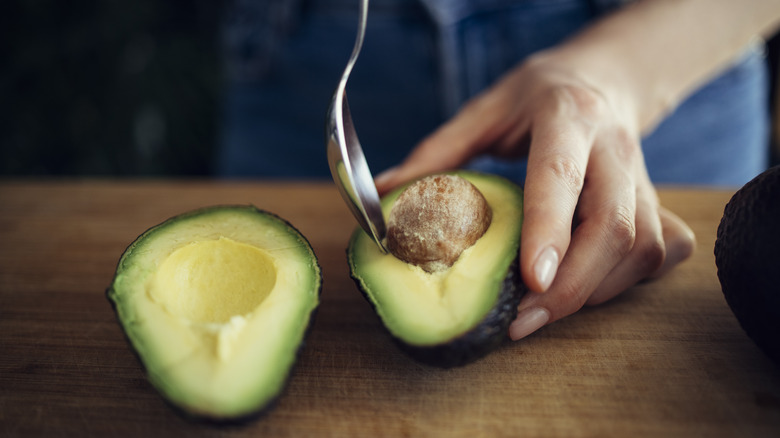What Happens To Your Blood Pressure When You Eat Avocado Every Day
Avocados are known for their creamy and rich flesh and their many health benefits. With origins in Puebla, South Central Mexico, the fruit is now enjoyed in many countries across the world.
Also referred to as "alligator pears" or "butter fruit," they contain healthy monounsaturated and polyunsaturated fats, lots of fiber, magnesium, potassium, and vitamin E. The fruit that is notorious for ripening when you look away for two minutes, is great for eye health, brain function, healthy digestion, preventing a rise in insulin and blood glucose levels, and protecting you from heart disease.
Speaking of heart health, do you know that something else happens when you start eating more avocados? You can lower your blood pressure levels.
Blood pressure refers to the amount of force blood exerts against your arteries when your heart is pumping. High blood pressure, also referred to as "hypertension," is when this pressure is consistently too high, increasing your risk of heart attack and stroke.
Salt can increase the volume of your blood by making it retain more fluid and this can lead to hypertension. Avocados help high blood pressure with their rich concentration of potassium. Potassium works by lowering sodium levels in your blood by helping your body remove excess sodium via urine. Additionally, potassium works by relaxing your blood vessel walls, which also helps lower blood pressure.
But this is not the only way avocados lower blood pressure.
Other nutrients in avocado that help lower blood pressure
As we mentioned before, avocados contain a lot of fiber and healthy fats too, both of which play an indirect role when it comes to lowering blood pressure and protecting your heart.
According to a registered dietitian and certified diabetes educator, Veronica Rouse (via The Heart Dietician), the soluble fiber in avocados helps you decrease blood cholesterol levels, regulate blood glucose, and maintain a healthy weight. Being overweight is a risk factor for high blood pressure and so is having diabetes. Plus, "dietary intake of oleic acid [a type of monounsaturated fatty acid] has been shown to decrease cholesterol levels in the blood as well as blood pressure levels," added the expert.
Also, when you eat an avocado every day, you're automatically consuming a low-sodium food. Consuming high-sodium foods is associated with high blood pressure, heart disease risk, and kidney damage.
That being said, there is some concern if you're thinking of consuming avocados while on high blood pressure-regulating medication.
Avoid avocados if you're taking high blood pressure meds
If you're looking for natural ways to lower your blood pressure levels, avocados can do that for you, but it's also important to know what happens if high blood pressure goes untreated. Over time, hypertension can lead to damaged arteries, aneurysms, coronary artery disease, heart failure, metabolic syndrome, stroke, cognitive impairment, kidney problems, retinopathy, nerve damage in your eyes, blindness, erectile dysfunction, and vaginal dryness among other health concerns. So it's important to discuss your high blood pressure concerns with your doctor as well.
However, if you have visited a doctor and you're on medications for high blood pressure — like angiotensin-converting-enzyme, or ACE, inhibitors and angiotensin II receptor blockers, or ARBs — you shouldn't be eating avocados. According to chiropractic doctor Adam J. Story (via YouTube), this is because blood pressure-lowering medications have the side effect of increasing the retention of potassium in your body. Adding potassium-rich avocados into this mix could lead to irregular heartbeats or heart arrhythmias.
You should also avoid eating avocados if you have kidney problems, a sensitive digestive system or irritable bowel syndrome, or if you have an avocado allergy.
It is important to know what happens when you eat too much avocado too. Some carbohydrates in the fruit, like polyols or sorbitol, can be irritating for those with digestive issues. Avocados are considered a high-calorie fruit and eating too much can lead to weight gain as well. Avocados are like any other healthy food. Some people may not be able to tolerate them and there is also such a thing as too much of a good thing.



